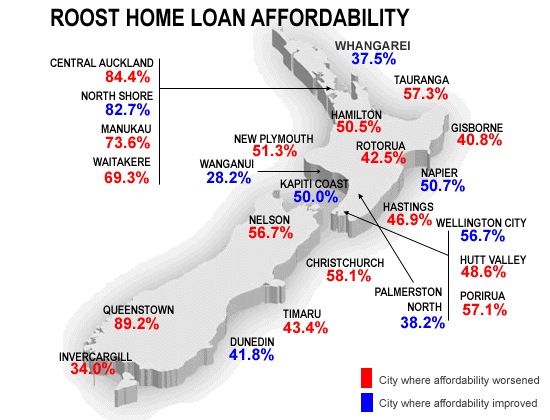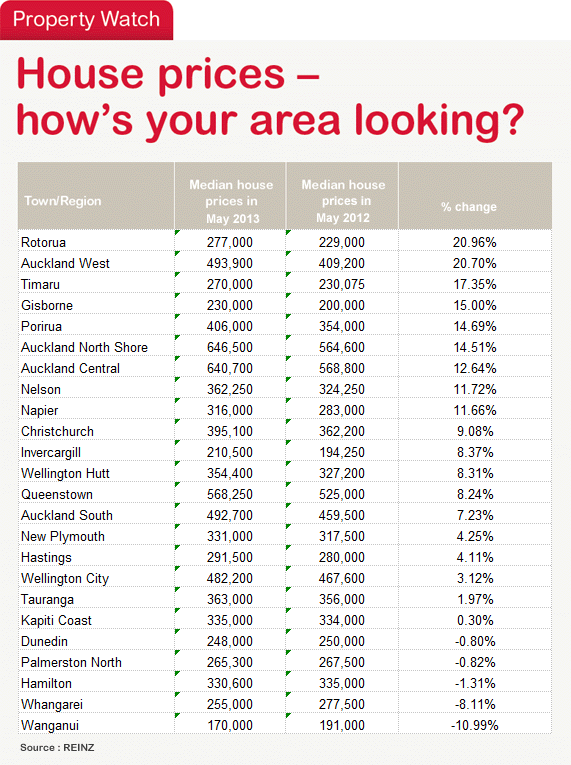
Rising housing prices and flat interest rates have seen housing affordability deteriorate to its worst levels in almost three years in May, according to the Roost Home Loan Affordability reports.
Affordability was the hardest for first home buyers on the North Shore in Auckland, where the Roost reports estimated a single first home buyer would have to spend almost 95% of their after-tax income on servicing their mortgage, even with a 20% deposit.
Affordability for regular home buyers and first home buyers worsened across most of the country and remains at its toughest in the biggest cities of Auckland, Christchurch and Wellington, where housing supply shortages and a fall in fixed mortgage rates over the last year have heated up the housing market.
Life looks set to get even tougher for first home buyers in the big cities in coming months if, as expected, the Reserve Bank puts 'speed limits' on low deposit home loans.
The government is pushing for some sort of exemption for first home buyers, but the Reserve Bank is determined to slow riskier lending growth. About a third of mortgages with deposits of less than 20% are to first home buyers.
"First home buyers will need to work harder in their negotiations with their bank to achieve their aims," said Colleen Dennehy, a spokeswoman from Roost Mortgage Brokers, which sponsors the reports prepared by Interest.co.nz.
"A mortgage broker can help a first home buyer negotiate the best deal when the banks toughen their rules," Dennehy said.
Roost Mortgage brokers had already seen some banks tighten their rules around low deposit lending over the last month in response to Reserve Bank pressure, she said. Some banks had reduced their availability of 90% plus mortgages or effectively increased interest rates for very low deposit mortgages.

The Roost Home Loan Affordability reports showed a slight deterioration in Auckland, Hamilton, Christchurch and Invercargill, with more significant falls in Tauranga and Nelson because of sharp rises in house prices. Affordability improved slightly in Wellington, Whangarei, Palmerston North and Wanganui.
Only interest rates remaining near record lows is stopping a further worsening, the Roost Home Loan Affordability reports show.
It is toughest for first home buyers in Auckland. It took 87.7% of a single median after tax income to afford a first quartile priced house in South Auckland in May, while it took 94.8% in the North Shore.
Central Auckland affordability is at its worst level since March 2010, although it remains below its worst ever levels of 107.3% of income required in November 2007 when interest rates were over 10%. They are now closer to 5%.
Nationally, affordability for someone on a single median income worsened by 0.1% in May from April, which meant it took 56.3% of after tax income to afford an 80% mortgage on a median house, according to the Roost home loan affordability report released today.
Interest rates were broadly flat in May and after-tax wages rose just over NZ$1 per week. A rise in the national median house price to NZ$392,000 in May from NZ$390,500 in April was the main cause of the deterioration.
Housing affordability is shaping up as a major economic and political issue over the next 18 months. The Reserve Bank and Government agreed on a toolkit of 'macro-prudential' controls last month that could see the central bank impose limits growth in high loan to value ratio mortgages. Central and local governments are also moving to address housing supply shortages.
For first home buyers – which in this Roost index are defined as a 25-29 year old who buys a first quartile home – there was also a deterioration in affordability in most cities.
It now takes 48.3% of a single first home buyer's income to afford a first quartile priced house nationally, up from 48.0% a month earlier. The most affordable city in New Zealand for first home buyers is Wanganui, where it takes 22.9% of a young person's disposable income to afford a first quartile home. The least affordable is the North Shore of Auckland.
Any level over 40% is considered unaffordable, whereas any level closer to 30% has coincided with increased buyer demand in the past.
For working households, the situation is similar, although bringing two incomes to the job of paying for a mortgage makes life considerably easier. A household with two incomes would typically have had to use 37.1% of their after tax pay in May to service the mortgage on a median priced house. This is up from 37.0% in April.
On this basis, most smaller New Zealand cities have a household affordability index below 40% for couples in the 30-34 age group. This household is assumed to have one 5 year old child.
For households in the 25-29 age group (which is assumed to have no children), affordability also worsened, with 23.4% of after tax income in households with two incomes required to service the debt, up from 23.2% the previous month.
Any level over 30% is considered unaffordable in the longer term for such a household, while any level closer to 20% is seen as attractive and coinciding with strong demand.
First home buyer household affordability is measured by calculating the proportion of after tax pay needed by two young median income earners to service an 80% home loan on a first quartile priced house.
-----------------------------------------------------------------------------------------------
Mortgage choices involve making a significant financial decision so it often pays to get professional advice. A Roost mortgage broker can be contacted by following this link »
-----------------------------------------------------------------------------------------------
No chart with that title exists.
Full regional reports are available below:
6 Comments
The leadersip in NZ and in Auckland in particular is truly something to behold!
I am away from NZ on business. My wife attended a packed morning auction at Barfoots in the City today. Money flying everywhere, houses going for 40-50% and more above cv in some instances... in a full room, she was one of only a handful of Pakeha New Zealanders, the rest were Chinese and Indian.
Needless to say we never got our house... Thanks John Key for your awesome leadership and looking after us young Kiwi first time home buyers! Am really looking forward to paying over half a million dollars for a two bedroom flat of 65sm in one of Len Brown's Stalin style blocks of flats and being crippled by debt for the next 40 years!
"only a handful of Pakeha New Zealanders, the rest were Chinese and Indian."
Same as what I'm hearing from family friends who are house hunting on the North Shore.
Most of the realestate agencys denying it of course "its only 10% foreign" - liars. They are making a killing out of the asian invasion, kiwis forced out of the housing market is a great sign of success for the realestate industry.
Cancel their visas send them back, retrospectively slap a 2 property limit on house ownership in Auckland - force a crash in prices.
We have to get together and tell the idiots in NZ government that protecting the average kiwi's interests is important.
You should hear what people in Singapore think about migrating to NZ. What free healthcare? Really? Free schooling? No way. What, a pension after living there for 10 years? No restrictions on capital investment from overseas? No capital gains tax? No stamp duty? My goodness I'm buying property there tomorrow, and moving there next week.
NZ is a joke when it comes to protecting the interests of its residents. A joke that the average kiwi pays for. Its about time that the government and the average kiwi wised up a little on what NZ looks like to investors from other parts of the globe, before its too late.
Someone needs to start a petition. Who's up for it?
Vote for Winston Peters and NZ FIRST.
Both the RBNZ and the Beehive drones are praying ...yes prayer is there!....that events outside NZ will strangle the bubble..anything to allow them to avoid doing the right thing.
Yeah well, I reckon I'm sounding like a broken record now, plus I'm blue in the face, and I hate to have to say it again, but where foreign non-resident buyers are concerned, I told you so, and a long time ago.
Will we wait for it to get to such ludricous numbers in the farming and business centre before everyone else wakes up, just a fraction too late, because I'm afraid that may be the case in Auckland's housing at the very least. It won't be just foreigners who will get their fingers burnt all the way up to the elbow if the necessary measures are taken to curb it.
Oh well, I guess I don't know anything


We welcome your comments below. If you are not already registered, please register to comment
Remember we welcome robust, respectful and insightful debate. We don't welcome abusive or defamatory comments and will de-register those repeatedly making such comments. Our current comment policy is here.